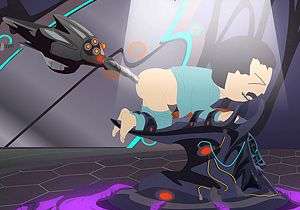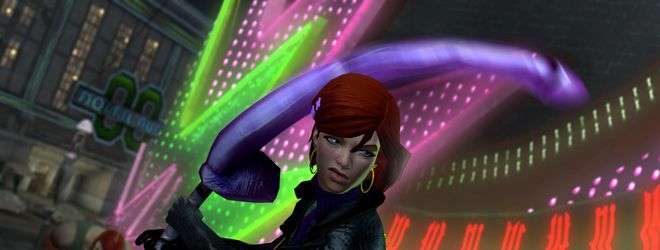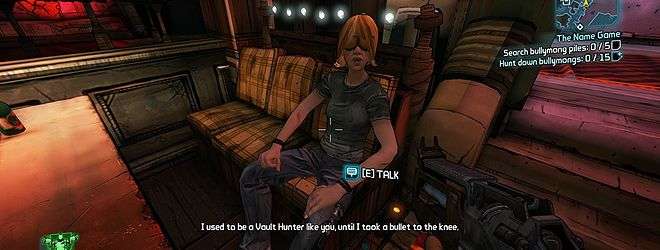Comedy in Video Games
by Adam Smith

You are paying for that snake to be dry-cleaned
They say that comedy equals tragedy plus time. And usually, that’s true. Take an awkward or tragic situation, put enough hours on the clock between it and the present and voila, humour occurs. Television and film have an absolute gold mine of comedic timing to play with, allowing anything up to an hour and a half for a joke to pay off (such as Paranorman).
It’s why British comedies such as Peep Show and The Office are so successful. Time is the great distance, an ever-widening plain, which is why it is very difficult to create a comedic video game.
This does not mean that video games are not funny – they clearly are. Games such as Portal, the Saints Row series, or Deadpool are humorous games, and there is usually a smattering of comedy laced in every game for good measure. But a game based solely around making its players laugh is a challenging feat for a number of reasons:
Distance
Most of the time, when something is funny, it is because it is not happening to you. Very rarely can someone immediately appreciate humour when it is he or she themselves that is the butt of the joke but, as we all know, (because I assume every reader of this article is human with some semblance of what a funny human interaction is) telling that story again merits raucous laughter. Distance between the joke and the occasion makes it funny. In a video game, however, everything is immediate; there is no past because we’re never really accessing memory or comparing the game to real-world scenarios. There’s no time for a set-up, nor for the player to get comfortable with one way of thinking just for another to appear by surprise; they are constantly awaiting a change in the world, something new to react to. It’s difficult for them to laugh at a situation because they’re always thinking about what is coming next. Which leads me to the next problem…
 Input
Input
Quite simply, there is too much input for a player in a video game. So much so that it almost floods the senses, which is what it’s intended to do. What video games have over films or books is the unity of sound, visuals, and movement, but if a player is focused too much on one of these elements, then any joke the developer has in mind falls apart. Compare this scenario with a comedy club – the comedian has crafted the pauses, and the rise and fall of their voice; this can’t be done with a video game without aeons of focus testing.
Freedom makes the video game powerful, yet it also ruins humour. While most comedy comes from an almost-certain inevitability that the tragic thing had to happen, in a video game most tragedies can be avoided, otherwise the player can’t successfully complete the game.
Audience Taste
This is possibly the best and worst quality of the video game: its difficulty, and its variety. You can’t be bad at watching a film; you can’t be bad at reading a book; but you can be bad at playing a video game, and that can break up the setup to a joke so easily. Hours spent crafting a certain punchline at the end of a level, only for the player to have made so many attempts to try and reach it that once they do, they are either fraught, or ecstatic. If the former, they may not be in the frame of mind to appreciate the joke – if it’s the latter then the joke is unlikely push them emotionally higher, or worse, it may belittle their success. Secondly, comedy isn’t universal, especially when playing a video game.
 Taking a recent example from South Park: The Stick of Truth, where Eric Cartman plays on the turn-based strategy that defines an RPG by telling another character (and the player) that this is just how the games work; a nice bit of metahumour that all players of RPGs will likely understand. But not all people know about RPGs, as some are bound to be new players. Just as Frankie Boyle doesn’t host children’s parties, the game needs to cater to everyone, and because comedy cannot do this, it’s easier for the developers to leave it out. If one goes to a comedy show, they know what to expect from the humour. Yet the taste of the gamer is so vast that the developer can’t be sure that they will be able to empathise.
Taking a recent example from South Park: The Stick of Truth, where Eric Cartman plays on the turn-based strategy that defines an RPG by telling another character (and the player) that this is just how the games work; a nice bit of metahumour that all players of RPGs will likely understand. But not all people know about RPGs, as some are bound to be new players. Just as Frankie Boyle doesn’t host children’s parties, the game needs to cater to everyone, and because comedy cannot do this, it’s easier for the developers to leave it out. If one goes to a comedy show, they know what to expect from the humour. Yet the taste of the gamer is so vast that the developer can’t be sure that they will be able to empathise.
Laughter may be the best medicine, but right now the games industry has an illness we cannot find the cure to.
Last five articles by Adam Smith
- Best of 2014 - Comedy in Videogames
- Fates Forever - Review
- Lifeless Planet - Review
- Transistor - Review
- Comedy in Video Games





















Don’t forget the other big problem is that most video games are so badly written
For me, comedy in games is already pretty prevalent but, as you’d expect, it’s also very subjective. For instance, I’m playing through Wolfenstein at the moment and have had some genuine belly laughs at various points… not necessarily because the humour has been outstanding, but more because if I hadn’t done something in particular (something you’re not prompted to do, and which isn’t obvious) then I wouldn’t have experienced the humour at all and it would have remained a very dark and serious moment in the game.
Although you’ve mentioned in the article that attempting that type of humour could have the opposite effect if it’s out of place… that’s what made it funnier for me. My curiosity had me check to see if it was possible to actually drive an abandoned vehicle and, instead, my guy climbed inside it, started to make “vrummm” noises whilst flailing the steering wheel around and pumping the horn. To me, that was SO out of place, yet such a worthwhile experience.
The same could be said for Fallout 3 when, as you read through the various inter-departmental memos, you see someone slowly deteriorate from being a very intelligent person into a mindless ghoul. It’s a very dark moment until suddenly a little joke will find its way into the memo and the horror of what’s going on becomes a little light-hearted, if only for a moment.
I can’t think of any games where I genuinely found them ‘funny’ as games, except perhaps The Book of Unwritten Tales. That would depend entirely on your own sense of humour though, as they were deliberately going for ‘funny’, which is usually more difficult than sudden bursts of humour. In Burnout Paradise it was the retro-celebration with the naming convention of the various buildings (Holness Hotel, Wogan’s, Inspiral Carpark etc) that cracked me up even though it would likely have been lost on most. The sarcastic relationship between Delsin and Reggie in inFAMOUS: Second Son also made me laugh on a number of occasions, and I just generally found Borderlands to be pretty damned funny from beginning to end… especially when General Knoxx was introduced.
So, overall, I’d likely have to disagree with most of the article as I’ve never found that I’m too immersed in a scene to appreciate the humour, or that my senses are being flooded to the point where I’d miss it entirely. That’s just me, however, and I fully expect that thousands of people played the same games I have without even raising a smile where I may have laughed. So I’m not disagreeing ‘on the whole’, but just for me personally as I think most games I’ve played got it spot on with the humour.